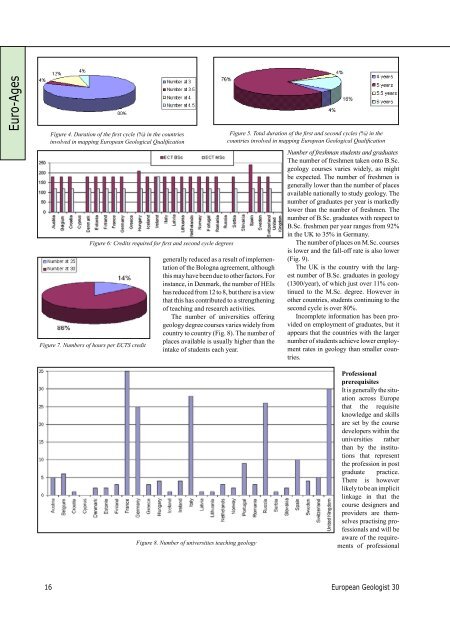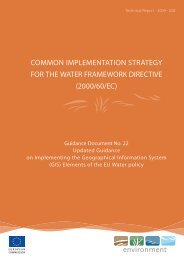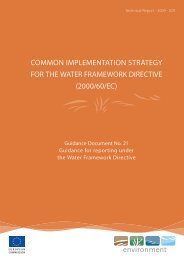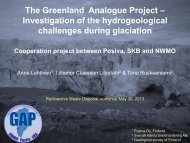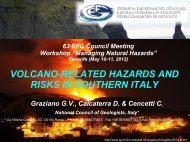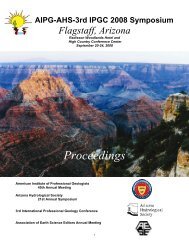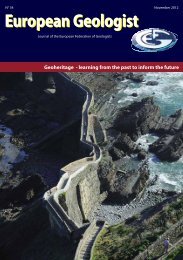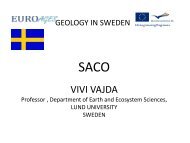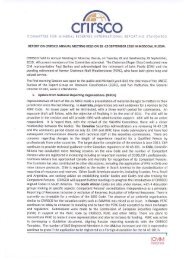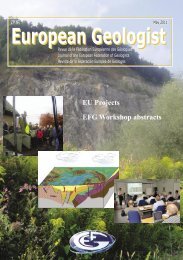EGM 30 download.pdf - European Federation of Geologists
EGM 30 download.pdf - European Federation of Geologists
EGM 30 download.pdf - European Federation of Geologists
You also want an ePaper? Increase the reach of your titles
YUMPU automatically turns print PDFs into web optimized ePapers that Google loves.
Euro-AgesFigure 4. Duration <strong>of</strong> the first cycle (%) in the countriesinvolved in mapping <strong>European</strong> Geological QualificationFigure 6: Credits required for first and second cycle degreesFigure 7. Numbers <strong>of</strong> hours per ECTS creditgenerally reduced as a result <strong>of</strong> implementation<strong>of</strong> the Bologna agreement, althoughthis may have been due to other factors. Forinstance, in Denmark, the number <strong>of</strong> HEIshas reduced from 12 to 8, but there is a viewthat this has contributed to a strengthening<strong>of</strong> teaching and research activities.The number <strong>of</strong> universities <strong>of</strong>feringgeology degree courses varies widely fromcountry to country (Fig. 8). The number <strong>of</strong>places available is usually higher than theintake <strong>of</strong> students each year.Figure 5. Total duration <strong>of</strong> the first and second cycles (%) in thecountries involved in mapping <strong>European</strong> Geological QualificationNumber <strong>of</strong> freshman students and graduatesThe number <strong>of</strong> freshmen taken onto B.Sc.geology courses varies widely, as mightbe expected. The number <strong>of</strong> freshmen isgenerally lower than the number <strong>of</strong> placesavailable nationally to study geology. Thenumber <strong>of</strong> graduates per year is markedlylower than the number <strong>of</strong> freshmen. Thenumber <strong>of</strong> B.Sc. graduates with respect toB.Sc. freshmen per year ranges from 92%in the UK to 35% in Germany.The number <strong>of</strong> places on M.Sc. coursesis lower and the fall-<strong>of</strong>f rate is also lower(Fig. 9).The UK is the country with the largestnumber <strong>of</strong> B.Sc. graduates in geology(1<strong>30</strong>0/year), <strong>of</strong> which just over 11% continuedto the M.Sc. degree. However inother countries, students continuing to thesecond cycle is over 80%.Incomplete information has been providedon employment <strong>of</strong> graduates, but itappears that the countries with the largernumber <strong>of</strong> students achieve lower employmentrates in geology than smaller countries.Figure 8. Number <strong>of</strong> universities teaching geologyPr<strong>of</strong>essionalprerequisitesIt is generally the situationacross Europethat the requisiteknowledge and skillsare set by the coursedevelopers within theuniversities ratherthan by the institutionsthat representthe pr<strong>of</strong>ession in postgraduate practice.There is howeverlikely to be an implicitlinkage in that thecourse designers andproviders are themselvespractising pr<strong>of</strong>essionalsand will beaware <strong>of</strong> the requirements<strong>of</strong> pr<strong>of</strong>essional16 <strong>European</strong> Geologist <strong>30</strong>


